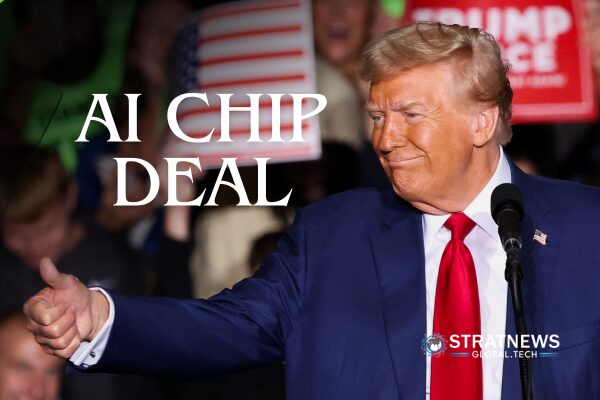Trump Signals Possible Nvidia AI Chip Sales to China
US President Donald Trump has suggested he may allow Nvidia to sell a reduced-performance version of its next-generation Blackwell GPU chip to China. The proposal comes despite strong opposition in Washington from policymakers who fear China could use US artificial intelligence technology to enhance its military capabilities.
Critics warn the move could provide Beijing with more advanced computing power, even as the US and China continue their battle for technological dominance.
Scaled-Down Blackwell Chips Proposed
Speaking to reporters, Trump referred to discussions with Nvidia CEO Jensen Huang, suggesting the new Blackwell chip could be “enhanced in a negative way” — in other words, with its performance reduced by 30% to 50%. Trump said Huang may meet him again to discuss the matter, calling it “an unenhanced version of the big one.”
The Trump administration recently confirmed a rare agreement with Nvidia and AMD that would see the US government receive 15% of revenue from certain advanced chip sales in China. This announcement rattled both Republican and Democratic China hawks, who have long pushed to keep Beijing several generations behind in AI hardware.
Former White House technology adviser Saif Khan warned that even scaled-down versions of Nvidia’s most advanced chips could allow China to build world-class AI supercomputers, potentially enabling it to surpass US capabilities.
The H20 and Export Controls
Currently, the most advanced chip Nvidia can legally sell to China is the H20, based on the company’s older Hopper architecture. Nvidia unveiled the Blackwell platform in early 2024, claiming it is up to 30 times faster than its predecessor. Reports in May indicated Nvidia was preparing a cheaper variant of the Blackwell chip specifically for China, though the company has not confirmed the product’s specifications.
China’s foreign ministry did not immediately comment on Trump’s remarks. In the past, it has accused Washington of using technology restrictions to “maliciously contain and suppress China.”
Trump & A Rare Revenue-Sharing Deal
In defending the 15% revenue-sharing arrangement, Trump argued that the H20 chip was “obsolete” because China already had access to it. He said he initially pushed for a 20% share before settling on 15%. The deal represents an unusual intervention in corporate affairs, following previous instances where Trump pressured companies to invest in US manufacturing and publicly criticised tech executives with ties to Chinese firms.
The US Commerce Department has begun issuing licences for H20 sales to China. Officials have stated they do not believe these chips compromise national security. Nvidia confirmed it had not shipped H20 units to China for months but expressed hope that export control rules would allow it to compete in both China and global markets. AMD also confirmed it had received approval to export certain AI processors to China, saying it complies fully with US export regulations.
with inputs from Reuters


